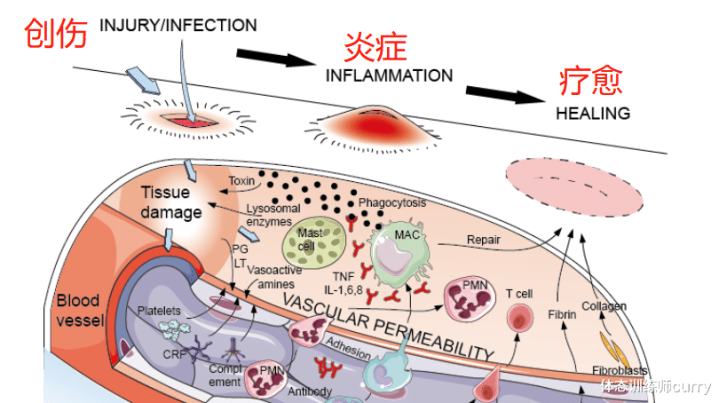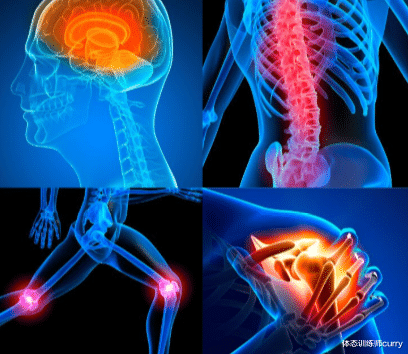I think most of my friends have heard of inflammation, but they don’t know much about what inflammation is in the body. Not to mention lowering the level of inflammation in your body with lifestyle changes. Many chronic diseases in our body develop unconsciously from small inflammations. Chronic diseases cannot be cured. One of the methods is to start with daily diet. “Anti-inflammatory diet” has been widely recommended in nutrition in recent years. Why is it so popular? One of the important factors is to reduce the level of inflammation in the body through daily diet. Today’s topic will talk about inflammation-related content and how to reduce the level of inflammation in the body through scientific and natural methods.

After reading this article, you will gain the following four aspects:
Definition of inflammation
What factors can lead to chronic inflammation?
How to determine if there is chronic inflammation
How to improve chronic inflammation in the body
Inflammation definition< /p>
Inflammation is part of the body’s immune system, the process by which the immune system recognizes damaged cells, irritants or pathogens and begins a healing process. In general, inflammation is divided into acute inflammation and chronic inflammation.

Acute inflammation is more of a positive effect, when the body is exposed to certain triggering conditions, damage to tissue Chemicals are released that tell the white blood cells to start repairing to remove anything harmful to the body and heal damaged tissue. This process usually involves symptoms such as swelling, redness and pain, and after a few days or weeks, the body returns to its normal state. We often say that acute bronchitis, physical reactions after high-intensity training, and even appendicitis are all acute inflammations.

while chronic inflammation is more of a negative effect on the body, a long-term behavior that can eventually lead to damage to healthy tissues and organs. Attacks, resulting in diseases like rheumatoid arthritis, diabetes, and heart disease. In other words, the symptoms of chronic inflammation are less pronounced and less noticeable, quietly engulfing normal cells and causing tissue and immune system dysfunction and decreased health.
What factors can lead to chronic inflammation?
A big reason behind our promotion of a healthy lifestyle is to minimize these chronic Chronic diseases caused by inflammation. In other words, most of our body’s chronic inflammation is also triggered by an unhealthy lifestyle. What factors contribute to chronic inflammation? Mainly reflected in the following points:

Diet structure: The intake of refined carbohydrates, high sugar diet and trans fatty acids Wait, these unhealthy diets can promote the production of inflammation in the body, and slowly lead to obesity, insulin resistance and cardiovascular related problems.

Smoking and alcohol: Toxins in cigarettes such as formaldehyde, cyanide, arsenic and lead can damage the body’s cells to trigger Inflammatory response, the metabolism of alcohol leads to the production of reactive oxygen species, which in turn stimulates the inflammatory response.

Stress and sleep: Acute stress may have a positive impact on immune system function, and we live mostly chronically Stress, which constantly stimulates our immune response, triggers inflammation in the body and brain. Irregular and low-quality sleep can affect various hormone levels in the body, which are associated with chronic inflammation such as obesity, diabetes and depression. In addition, stress and sleep can affect gut health and increase disease-causing bacteria.

Body Composition: If you are overweight, fat cells will also increase, and fat cells are not only simply storing excess Heat causes obesity, and it can also produce an inflammatory response, which affects the balance of normal adipokines, and then the body produces chronic inflammation, insulin resistance, and even diabetes, cardiovascular disease and other problems.

Other factors that contribute to chronic inflammation include physical inactivity, autoimmune diseases caused by aging, viral and bacterial infections, and exposure to pollution.
How to determine if there is chronic inflammation?

It can be seen from the above analysis that if there is no healthy lifestyle or high stress in daily life and poor sleep quality, then chronic inflammation Basically there will be more or less. The method of detecting chronic inflammation in medicine is through the examination of blood indicators. There are two key indicators for reference: The first is the number of white blood cells. An increase in the number of white blood cells in the blood may mean that more white blood cells have been recruited, which is one of the manifestations of inflammation in the body; The second is C-reactive protein (CRP). A high level of this level in the blood may indicate a problem with the body’s immune system. When chronic inflammation slowly accumulates, it can cause many health problems, such as cancer, atherosclerosis and type 2 diabetes.
How to improve chronic inflammation in the body
No matter whether our body has chronic inflammation or not, healthy lifestyles and habits must always be promoted. Diet, exercise, sleep and a good mood are essential.
First, anti-inflammatory diet

Eat less inflammatory ingredients, Eat more anti-inflammatory ingredients, mainly ingredients containing antioxidants, avoid deep-processed products, and ensure a balanced diet for each meal to meet the body’s needs for the three major nutrients, vitamins, minerals, dietary fiber and water.
So how to choose the ingredients becomes the key, but generally speaking, the ingredients that meet the above requirements have the following four characteristics:
The ingredients are clean and fresh
Mainly fruits and vegetables, beneficial fats and proteins
It is rich in nutrients and can provide a variety of antioxidants
The variety of foods is also rich and colorful, mainly dark-colored ingredients< /p>
Dietary features like this have been shown to reduce levels of chronic inflammation, such as CRP.
The following ingredients are especially recommended, which can effectively reduce the level of chronic inflammation in the body.

Vegetables: kale, broccoli, spinach, asparagus, okra, tomatoes, peppers, and onions Such as dark leafy greens, which contain powerful antioxidants, flavonoids, carotenoids, and vitamin C, all of which help prevent cell damage and reduce chronic inflammation levels in the body.

Fruits: Compared with other fruits, berry fruits have a very high antioxidant capacity, and their sugar content is higher than that of other fruits. Many other fruits are low, especially blueberries. Berry fruits also contain high amounts of anthocyanins, vitamins, minerals and other compounds that can help boost the body’s immunity and reduce the risk of heart disease.

Deep sea fish:Deep sea fish are a great source of omega-3 fatty acids EPA and DHA, which also contain Rich in protein, such as tuna, salmon, etc. These fish are rich in omega-3 fatty acids, the most potent ingredients that have been shown to reduce chronic inflammation, and people who ate salmon or EPA and DHA supplements had significantly lower levels of C-reactive protein, an inflammatory marker. Chia seeds, flax seeds and walnuts are also great sources of Omega-3 for customers who don’t like to eat fish.

Other anti-inflammatory ingredients include avocados, mushrooms, green tea, garlic, dark chocolate, and olive oil. It even includes coffee, which contains antioxidants like polyphenols that help fight free radicals in the body, but be careful to avoid pro-inflammatory ingredients like additives, sugar-sweetened creamers, syrups and creams in coffee Wait.
Finally, it should be noted that although the ingredients are good, do not consume too much. When the body ingests more than it consumes, it will have the same adverse effect, increasing fat and causing obesity. Obesity is also one of the factors of chronic inflammation. While consuming good ingredients, avoid refined carbohydrates, fried foods, sugar-sweetened beverages, processed meats, and junk foods like trans fatty acids.
Second, moderate exercise

When we exercise,Our muscle tissue actually triggers acute inflammation, where the presence of inflammation is more of a positive effect. When muscle fibers are damaged, the body increases blood circulation to help it repair tissue, so more nutrients are delivered, which ultimately leads to muscle growth. In this process, not only the insulin sensitivity of the body is improved, the efficiency of glucose utilization is improved, but also the burning degree of fat cells is increased, and the release of inflammatory cytokines produced by human fat is also inhibited.

Long-term exercise habits like this will help the body reduce chronic inflammation levels. Many studies have shown that both aerobic and anaerobic exercise can reduce C-reactive protein levels. The lower the level of C-reactive protein in the body, the less chance of inflammation. But overtraining, or not giving the body enough time to recover between workouts, can also lead to increased chronic inflammation over time.

In order to maximize the reduction of chronic inflammation in the body, there are three suggestions for exercise:
It is best to have 30 minutes a day Moderate-intensity exercise left and right. Regardless of the form of exercise, stay at around 65% of your maximum heart rate. Or strength training in the intensity range of 8 to 12rm.
Strength training combined with cardio. Strength training targets musculoskeletal muscles, and aerobic training improves cardiorespiratory levels. The combination of the two will maximize the benefits of the body.
Gradually increase the intensity of exercise, while paying attention to rest. Learning to rest is also part of training, and it is the basis for reducing inflammation in the body.
Third, sleep and stress

When we suffer from many During chronic stress, our bodies also release the stress hormone cortisol, which over time can lead to chronic inflammation. Therefore, maintaining a good stress level, learning to release it, and relieving yourself from stressors is critical. You can use yoga, Pilates, outdoor walks, and meditation to improve your physical and mental well-being. At the same time, ensuring the quality of sleep is also an important means to relieve stress and maintain emotional stability, which will activate the parasympathetic nerves of the nervous system and put the body in a state of anti-inflammatory.
Conclusion

The health of the body is actually more of a comprehensive factor, no matter diet, exercise, sleep or emotions It’s just one of the points. It’s a bit like the barrel theory. The final ability depends on the short board in the barrel, so try to look at this matter in a balanced way. The more you know about sports science, the more beneficial it will be to achieve your goals and improve your physical fitness. If you are in the right direction, you can go further. Come on, everyone. Let’s encourage each other.